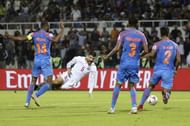Coming into their last game against Bahrain at the Asian Cup, India had a 10 percent chance of losing the match, given their past performance. The Blue Tigers made it possible to knock themselves out of the tournament.
The 0-1 loss at the Al Sharjah Stadium against Bahrain was not only a shock to the whole country but also dented India’s pride which they earned in the previous two matches.
The team, which earned a reputation with their incisive attacking display, was denied a draw and place in the knock-out rounds.
Jamal Rashed scored the only goal of the match from the spot-kick in the 90th minute to seal the fate for the country, which made history by entering the knock-out of the tournament for the first time.
It was India who had the chance to create it, but they fell short thanks to the negative strategy by Stephen Constantine.
Most of the players are young and may have a chance to shine again at this stage. But sadly, this was probably the last time we have seen Sunil Chhetri in this tournament, as he left the field in tears.
Let us look at the reasons which cost India the game:
#3 Miscommunication regarding Anas’ injury

Barely 90 seconds had gone into the match and not all the spectators in the stadium had taken their seat, Anas Edathodika had started limping on his feet. Looking at his face, one could easily understand the player is reeling in pain.
The word was written on the wall. In no time, Anas was substituted by Salam Ranjan Singh. Bemused Indian spectators were still trying to understand what has transpired on the field. It looked like an old injury just occurred to Anas, who had his left knee heavily strapped coming to the field.
It was a big blow considering the situation of the match. Not only Anas has a good understanding with Sandesh Jhingan, but he has also performed quite well in the last two matches, silencing his criticizers.
India should be lucky that Salam, who has not played enough matches for his club and country in recent times, put up an impressive performance throughout the match.
But the question reverberated in the stadium was, why Anas was allowed to take the field when he was not fully fit?
Certainly, the onus is on the team doctor and the coach, who took the decision. India lost a crucial substitution just 90 seconds into the match, which could’ve led them to more danger.
Also, why Anas did allow himself to be in the starting line-up if he felt something awkward before the match? His football career would’ve been over if something untoward happened within that time.
The way the Indian team handled the situation regarding Anas only shows their inexperience in this tournament.
#2 India lost the ball too many times which allowed Bahrain to dominate

From the very first minute, India had no intention of controlling the ball. They attacked on counters quite a few times in the first half, but then again lost the ball cheaply to their opponents. It allowed Bahrain to take control of the match.
Never in this tournament had India had more ball possession than their opponent. They had 32 percent against Thailand, 35 percent against UAE and got it better by five percent against Bahrain.
It’s true that the result of the matches doesn’t depend on ball possession entirely, but teams get an upper hand while controlling the ball on their feet.
That is what happened with Bahrain. Indian players did not even keep the ball for more than 15 seconds. Bahrain was more confident when they had the ball and plenty of miss passes from the Indian players only made their job easier.
The Indian defenders were also pressurized because of this. Bahrain had only one motto, to win the game.
For that, whenever they had the ball, the tried to make use of it. They made forward passes, ran down the flank, crossed to it forwards.
Bahrain’s never-say-die attitude ultimately proved successful as they got the penalty in crucial time.
#1 Stephen Constantine and his wasteful strategy

By the time you read this article, you would already know the fate of Stephen Constantine. Indian coach has resigned from his position immediately after the match. Honestly, he had to.
India has improved so many things under him. From 173 to 97 in the ranking is not a mean achievement.
Even, two of India’s opponents in the Asian Cup were under them in the rankings. Also, the country has seen a large pool of youngsters coming out wearing the national jersey in the past four years.
But Constantine has made this Indian team look like a Ferrari, but put the speed limit on 40 kmph.
India have earned praise from all over the world with their performance against Thailand. A 4-1 thrashing of team technically superior to them showed India are no travelers this time around.
However, they made themselves look like a traveler in their last match and it was solely because of their British coach.
The inclusion of Rowllin Borges in the starting line-up in place of Anirudh Thapa ensured the ultra-defensive strategy of the coach. Constantine wanted to lock all the gates that lead to his team’s goal.
India was not playing in their usual self from the first minute. They were concentrating more on the defence rather than making their usual counter attack.
Udanta Singh, Halicharan Narzary and of course Sunil Chhetri had no role to play for a major part in the second half.
Udanta, to make his presence visible, was coming down along with Chhetri to help the team in defence.
He made one perfect tackle within the box in the second half and we have to rub our eyes for once to see it was done by the Manipuri winger.
You are not allowed to deploy ‘park the bus’ strategy in competitive tournaments like this and India suffered what was an expected outcome.
